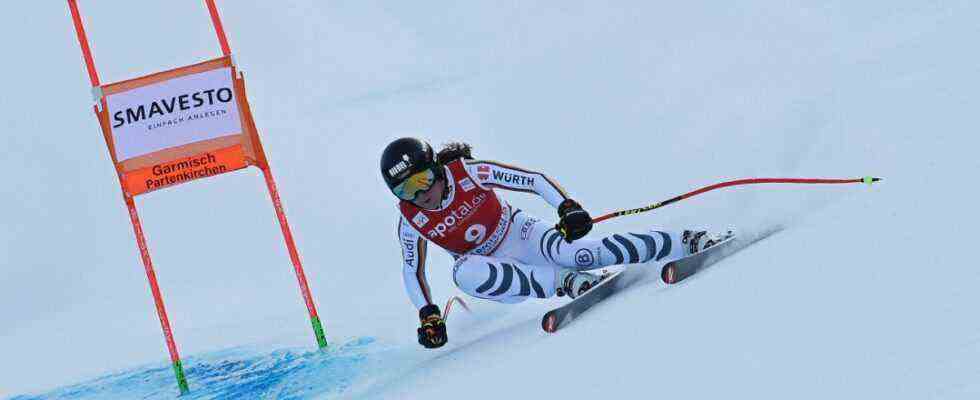He looks good, tall, slim, strong colour. He just stands there a little stiff, the new guest of honor at the finish of the Kandahar slope. But that’s no wonder with the icy wind whistling over the finish stadium on Friday during the last training run of the alpine ski racers, who will contest a final downhill run on Saturday and a Super-G on Sunday (11.30 a.m. each time) this weekend. before going to the winter games. And the guest of honor, which is actually a video board in the shape of the Kandahar-K, has other properties anyway.
If a runner undercuts the best time at the finish, it should glow green like a chameleon at the weekend, and it also has a virtual shower of gold in its program. In addition, the organizers have pulled up a 42-meter-long LED banner, which should at least send a few digital cheers to the runners. “We just wanted to present something new in Corona times,” says Florian Fischer, the new President of the Garmisch-Partenkirchen Ski World Cup. Real spectators are again not allowed, the latest decisions of the state government came too late.
Every year, the Ski World Cup is one of the biggest visiting cards for the Garmisch Ski Club, which Florian Fischer has also been in charge of since last August – father Peter retired after a long period of service and is now working in the background. And this year the event is a little more important than usual, the ski club and the German Ski Association (DSV) are once again applying for the Alpine World Championships – this time for 2027 after it didn’t work out for 2025.
The documents have been with the Fis World Association since autumn, and next May the Fis Council will select one of four applicants: Crans-Montana/Switzerland, Narvik/Norway, Soldeu/Andorra or Garmisch-Partenkirchen. And at least the German attempt should be successful, because according to Fischer there will not be another attempt, most likely: “There are strong monetary reasons for this.”
“There is a lot of discussion about sustainability,” says Garmisch Ski Club boss Florian Fischer about the changed plans
Their plans, which they once played out for the 2025 World Cup, have now taken a few turns. Originally, all World Championship races were to flow together at the foot of the Kandahar, in a new, permanently installed finish stadium; with 5000 spaces and parking garage. The new designs now provide for two centers again, one on the Kandahar – without a new target stadium, but with temporary grandstands – and one on the Gudiberg, where they are hosting two men’s slalom world cups at the end of February.
On the one hand, this logistics no longer poses problems for the TV stations, on the other hand, says Florian Fischer: “There is a general rethinking in society. There is a lot of discussion about sustainability.” In Garmisch-Partenkirchen, according to Fischer, people are already living sustainability: “All routes are ready to race, and we want to use them in 2027 as well,” says Fischer.
Freely translated: Not every competitor can offer that.
The municipal council recently supported the plans with a very clear vote (23:6 votes), but it did not go without a debate. Greens and nature conservationists repeatedly complained that for the World Cup, despite everything, massive interventions were being made in nature, with snow-making systems and basins that would have to be expanded. A recent council meeting stirred up disagreements again: In the confidential application book of the people of Garmisch, which had been made public, there were sketches of a newly planned congress center for up to 1700 participants; during the World Cup it could serve as a media center.
At the start, skiers on the Kandahar can look down on the village.
(Photo: Karl-Josef Hildenbrand/dpa)
Whether the center will be built at all is to be decided by a public dialogue – which is still pending. Free voters and the Greens saw this as a glaring “contradiction”. Florian Fischer affirms: “All that is currently being communicated is visualizations, ideas, nothing more and nothing less.” At major events, every municipality commits itself to certain “flagship projects” with which a city can be modernized. In Garmisch-Partenkirchen, this could be the congress, says Fischer: “Whether and how, that’s not in our decision-making authority.”
In any case, the concept itself is strong, and they also see it that way in the DSV. As far as the timeline is concerned, it would be the Germans’ turn, actually: Garmisch-Partenkirchen last hosted the Alpine World Cup in 2011, Switzerland, probably the biggest competitor, in 2017 in Sankt Moritz. “But,” Wolfgang Maier, the sports director at DSV, points out, “these are always political decisions. There are many other issues that play a role.”
The influence in the Fis-Council, for example, also in the ski industry, where Austria and the Swiss are traditionally very present. Almost two years ago, Saalbach-Hinterglemm won with twelve votes (Garmisch and Crans-Montana each received one vote), and now? “Personally, I have an extremely mixed feeling,” says Maier. Florian Fischer is in a more positive mood: “I’ve only heard good things.” The settlement will be settled next May in the Algarve town of Vilamoura, known for its sustainable marinas, golf courses and casinos.

